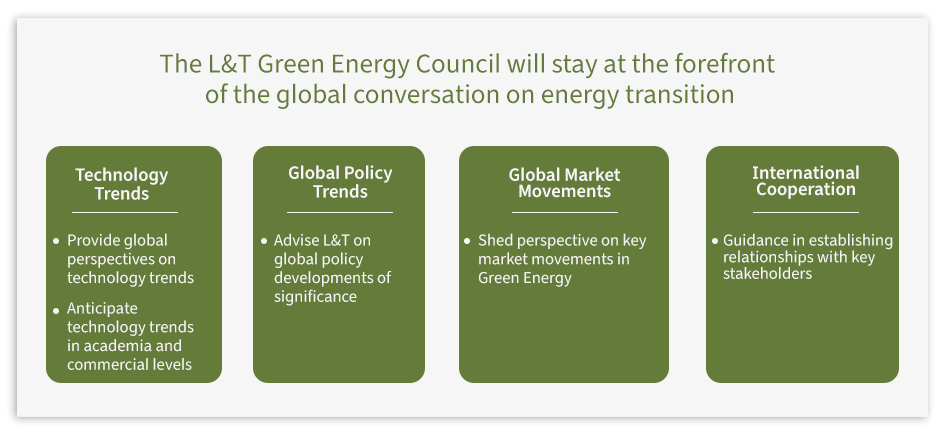L&T Group Websites
- Corporate
- Corporate – Arabic
- CarbonLite Solutions
- GreenTech
- Heavy Engineering
- Hydrocarbon
- LTIMindtree
- L&T Construction
- L&T Construction & Mining Machinery
- L&T Finance
- L&T Howden
- L&T Hydraulics
- L&T Infrastructure Finance Company Limited
- L&T Institute of Project Management
- L&T Technology Services
- L&T Kuwait Construction
- L&T MBDA Missile Systems Limited
- L&T Metro Rail (Hyderabad) Limited
- L&T-MHI Power Boilers
- L&T-MHI Power Turbine Generators
- L&T Precision Engineering and Systems
- L&T Realty
- L&T-Sargent & Lundy Limited
- L&T Special Steels and Heavy Forgings
- L&T-SuFin
- L&T Valves Limited
- Nabha Power Limited
- L&T Public Charitable Trust
- Rubber Processing Machinery
- Shipbuilding
- L&T Skill Trainers Academy
Green Energy Council
As the world transitions towards the net-zero emission goal, India has set ambitious targets and committed to five decarbonisation targets in the 2021 COP’26 meet. This includes bringing non-fossil energy capacity to 500 GW by 2030, achieving net-zero emissions by 2070, meeting 50 per cent of the energy requirement through renewable energy by 2030, reducing carbon intensity of the economy down to 45% by 2030 and reducing 1 billion tons of carbon emissions by 2030.
With this shifting business landscape, energy majors across the world are adapting and diversifying into renewable and low carbon energy. In the new energy landscape, Hydrogen, Battery Energy Storage, Carbon Capture & Utilisation, Biofuels etc. are emerging as prominent segments apart from solar, wind and other renewable power sources, for achieving decarbonisation goals.
L&T Energy GreenTech, taking the lead in powering this energy transition, has committed to building inhouse capabilities in green hydrogen project development/EPC, electrolyser manufacturing and battery cell manufacturing.
L&T has formed the L&T Green Energy Council, a think-tank comprising currently of four eminent thought leaders, in a significant step towards building a global green energy business.
The council will be responsible for identifying technology trends in green energy, analysing the evolving global policy developments, evaluate emerging business models and advise on collaborations.
Members - The Green Energy Council
|
|
Bart Biebuyck is the CEO of Hybart, a green hydrogen firm dedicated to facilitating the growth of global green hydrogen infrastructure. Previously, he served as the Executive Director of the Clean Hydrogen Partnership (CHP), a network consisting of 100 European companies and research labs supported by the EU. Prior to his roles in the hydrogen sector, Mr. Biebuyck gained extensive managerial and strategic experience while working as a Technical Senior Manager in the Drivetrain and Hybrid sector at Toyota Motor Europe. Under Mr. Biebuyck's leadership, the Clean Hydrogen Partnership (CHP) established a network of over 100 EU companies and research labs, forming the European Hydrogen Valleys partnership with approximately 40 EU regions. |
 Prof. Christopher Hebling |
Prof. Dr. Christopher Hebling is the director of the division of Hydrogen Technologies at the Fraunhofer Institute for Solar Energy Systems ISE. Prof. Hebling has been an Honorary Professor at the University of Cape Town since 2019 and actively participates in numerous national and international committees and conferences focused on hydrogen technologies and integrated energy systems. He obtained his doctoral degree from the University of Konstanz in 1998, specialising in "Crystalline Silicon Thin Film Solar Cells on Insulating Substrates." In July 2020, Prof. Hebling was nominated as an expert representative for Germany on the Executive Committee of the International Energy Agency IEA's Technology Collaboration Program for Research and Development on the Production and Utilization of Hydrogen. |
 Prof. Patrice Simon |
Prof. Patrice Simon is a distinguished French chemist specialising in materials science and electrochemistry. Prof. Simon currently leads a French National Initiative on Battery. His expertise lies in interfacial electrochemistry, with a particular focus on modifying the material/electrolyte interface to enhance the kinetics of ion adsorption and charge transfer in electrodes for energy storage applications. Since 2007, he has held the position of Distinguished Professor at Université Paul Sabatier. Previously, he served as the Director of the European Research Institute "ALISTORE ERI" and currently holds the role of Deputy Director at the French Network on Electrochemical Energy Storage (RS2E). In 2019, Prof. Simon became a member of the French Academy of Sciences. Prof. Simon obtained an M.S. degree in Metallurgy from ENSIACET in Toulouse, France in 1992. He went on to complete his Ph.D. in Materials Science in 1996. His research activities revolve around modifying material/electrolyte interfaces in electrodes for electrochemical energy storage devices such as supercapacitors and batteries. He earned his D.Sc. from Université Paul Sabatier in 2002. |
 Prof. Eicke R. Weber |
Prof. Eicke Weber holds the position of Vice President of ISES and co-Chair of the European Solar Manufacturing Council (ESMC). Until mid-2018, he served as the CEO of the Berkeley Alliance for Research in Singapore (BEARS). Previously, he was the Director of the Fraunhofer Institute for Solar Energy Systems ISE and held the position of Professor for Physics/Solar Energy at the Albert-Ludwigs-University of Freiburg, Germany. In addition, he served as the president of the Association of European Renewable Energy Research Centres EUREC from 2015 to 2017 and as Vice President of the International Solar Energy Society (ISES) from 2015 to 2019. Prof. Weber is also a founding president of the German Energy Storage Association BVES and a member of the German Academy of Science and Engineering. He served as the president of the Alexander von Humboldt Association of America from 2001 to 2003 and contributed to establishing the InterSolar North America conference and trade show in San Francisco in 2008. Prof. Weber pursued his studies in Physics at the University of Cologne, Germany, where he earned his doctorate in 1976 and habilitation in 1983. His research focuses on the analysis of lattice defects in Si and compound semiconductors for microelectronics and photovoltaics (PV) applications. Since the 1990s, he has actively participated in developing solutions to address the impending climate catastrophe. From 1983 to 2006, he served as a faculty member in the Department of Materials Science and Engineering at the University of California, Berkeley.
|



